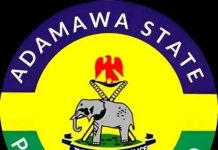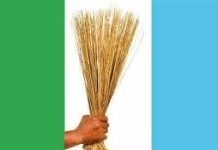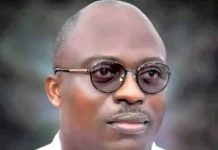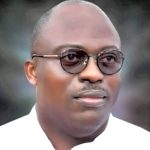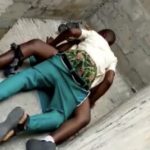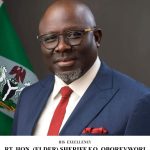The Social Democratic Party (SDP) candidate in the February 25 presidential election, Barr Adewole Adebayo, has said that proper auditing of the funds expended on fuel subsidy during the past administrations would have provided an alternative to its outright removal.
He also noted that he was not against President Bola Tinubu’s removal of fuel subsidy because he was fulfilling one of the campaign promises of his party, the APC.
Adebayo said this during an interview with Tribune Online‘s Subair Mohammed, where he spoke on the level of corruption and wastage in governance.
Do you think the country’s debt profile of N46.2 trillion is an encumbrance to the renewed hope of the APC-led government?
I am more concerned when it comes to debt. It’s not the load that kills; it is how you carry the load. The government’s debt cannot kill the government. There are three things to look out for about the debt – what did you use the debt for? The structure of the debt; what are the terms of the debt; the tenure of the debt? You also look at the issue of productivity. When you say your debt is high relative to your GDP, it means that if you increase your revenue and GDP, your debt will comparatively fall.
President Bola Tinubu’s pronouncement of removal of fuel subsidy since May 29, when he was inaugurated into office has been having a spiral effect on everything in the country. Some people are of the view that he should not have made the announcement at such a momentous time; what are your thoughts?
From what I know, especially for someone who took an opposite view when we started the campaign, President Bola Tinubu said he was going to remove subsidy during the campaign. Vice President Atiku Abubakar also said he was going to remove subsidy. With such kind of statement, I thought they had lost the election. Peter Obi also came around during the campaign to say that he was going to remove subsidy. So, I felt Nigerians would reject them, but it turned out that majority of the votes went to them.
For us that do not agree that removing subsidy is the best solution, we cannot come now and pretend that election hadn’t taken place. The people have made their choice. No matter what you think about it, the voters didn’t mind if they removed the subsidy, or they encouraged the three people to remove the subsidy. The only contribution we can make to the discussion now is to see how Nigerians can live well, move around well and grow the economy without the subsidy.
There are still subsidies in other areas but this fuel subsidy is gone now. The discussion going on now around the government with the unions is not to remove subsidy, but to see how the government can manage the fall out of the removal. With the removal, it will not cure the problem they want it to cure as time goes on. But, as a leader and someone who contested for the office of the president, I have no moral authority to criticise a man who is doing what he said he would do if elected. You don’t criticise a man for keeping to his word; just live with it.
Don’t you think that there would be some latent benefits from this subsidy removal in the long run, even if they are not immediate?
We knew how much we consumed. It’s just that we didn’t want to acknowledge it. To acknowledge, then you will see that people are taking the money away. That is why labour unions complained the other time that they didn’t know how much we consume and things like that. The people working at the Atlas Cove, pipelines, gas stations, tank farms, and different stations across the country; are they not members of your unions? Are they not the first to know what comes into the country? When you ship, the insurance company knows how much laden is in the ship, and how many metric tonnes in the ship.
When you finally offload, the owner of the tank farm knows how much was imported. If you go to Atlas Cove now, they know which ship is coming, and how much metric tonnes that is coming into the country. Every 33000 litres truck-load is received. All the dispensers are metered. If you know how much you consume at the meter point, then your problem is solved. It is not that difficult to know how much we consume and how much is frittered away. I know that subsidy alone won’t be enough to make an economic soup that would be palatable for everyone; you have other things that you need to look into.
For example, if you have savings of about N3 trillion from subsidy and you apply it into government, and N1 trillion and half of it is stolen, the people haven’t gained anything. If you take N1 trillion to make good roads and the people get value of N400 billion, then you haven’t saved anything. If you don’t generate employment, you have a problem. You will have cost push inflation because the workers and government would combine together to injure the economy. This is because the government has raised factor cost by raising the price of petrol, and workers would say minimum wage should no longer be N30000 but N100,000 and maybe, by the time they are through with negotiations, it would drop to N70,000.
All of them are driving the economy naught because inflation is going to come; there is going to be much more money to put out. You want interest rates to come down; how will it come down below inflation? If money is losing its value at 25 percent per annum, and I lend you money at 15 percent, I am losing already. These are some of the factors that the government needs to look into. I know the subsidy removal is hard, and as person that may go to the people tomorrow for their votes, I should be condemning the removal, but the truth of the matter is that the people removed the subsidy.
I warned Nigerians against voting for those who said they would remove subsidy, but they didn’t listen to me; now it has been removed. You have to take the injection with the pain, hoping that the malaria would be cured. Instead of quarreling with the government over the subsidy which is already gone and you allowed it to go, we must start to hold the feet of the government to fire. We should start scrutinizing the expenditures, not only expenditures meant to cushion the effect of subsidy but also expenditures generally.
We have to start saving money. We have to start growing our GDP. The investors coming into the country must have the ability that could have long term stability. That is why even though you might be against the policy being announced, flip flopping over policies is even worse. Today, fuel price is N488 per litre. In six months’ time, you are bringing it to N700. No, float it since you have decided to take the bullet for that one, but make sure there is competition, so that people don’t end up having ability to choke supply because that is what ends up with other products that have been freed.
The Nigeria National Petroleum Company Limited (NNPCL) must get out of importation business. Don’t rig the market. Allow everybody to bring their products to the market place. I don’t want the government to fix the price. The National Agency for Food and Drug Administration and Control (NAFDAC) doesn’t import drugs; it only regulates. The NNPC’s government should liberalise it. The business of bringing fuel into the country should be between the oil marketers and their bankers.
The federal Government said the money realised from the subsidy removal would be put into areas like education and health. As it stands now, do you think there is an alternative to removing subsidy?
Of course, there is. We need to audit the subsidy money to see that it is not all the money we spent in the name of subsidy. I thought we had capacity to audit properly and meter at every stage. We have capacity to get our legacy refineries to work and any other commercial refinery that anyone establishes like that of Dangote. You cannot force them to sell their products because they would be unwise to ignore the marketers around them. You have modular refineries you can create.
More so, all monies in government are unified. If I make savings from other leakages elsewhere, I can use it to cushion what I spent on subsidy. If I get more revenue to the government, I can also make sure I use that money. For example, if you are spending N4 trillion on subsidy, you can reduce it to N2 trillion with proper audit. But it is not their manifesto, so you can’t force it on them. Maybe, they didn’t believe that we have capacity to use the alternatives; maybe they didn’t listen to it, or maybe they listened more to music of the campaign. The bottom line is that by June ending, subsidy would be gone.
What we may prepare people for is to know that removing subsidy is just one of the options you have to deal with the financial anaemia in government. There are other things you can do without removing subsidy. On top of that, after removing the subsidy, it doesn’t mean the problems will go away. If the government wants to grow the Gross Domestic Products (GDP) by six percent, the subsidy savings will help to achieve maybe 10 percent of that. You still have about 90 percent to find money elsewhere. These are the issues they have to deal with. If you look at the 2023 budget as a microcosm, half of that has subsidy provision, the other half doesn’t have.
Your half year savings from the subsidy didn’t make a dent in the deficit. We still have to borrow. There is no one door to solve an economy problem. But they have taken one liberal door to solve it, hoping that their partners in the International Monetary Fund (IMF) and World Bank and International community will cooperate with them.
The president also talked about interest rates and the forex market. These are purely monetary issues that rest squarely with the Central Bank of Nigeria (CBN); what is your take on that?
If you studied the All Progressives Congress’ (APC’s) renewed hope manifesto, you won’t be surprised at what is playing out presently because these are clearly what they said they were going to do. Of course, there have been some contradictions. For example, if you say you want to unify the exchange rates, and that is if you allow the market to determine it, you can pretend that you don’t know much about the market and say the dollar is N500.
Then people won’t bring out their dollars out. So, what we call a dual exchange rate is what the government says it is selling exchange rate, and what another person sells his own.
So, the only way the government can unify the market is by selling its own dollar at the market rate because the government cannot force me to sell my dollar to them at their own official rate. Rather than do that, I will keep it, take it outside and do whatever I like with it, which is what is happening. So, the unified market, when created, should not be under the control of the government.
The government will just be a player there which means it will now begin to think of how not to be a buyer but a supplier. But, if the government is demanding more than it is giving, then it must be blowing its own currency.
Demand and supply will be the order of the day. If that is the case, how do you now control the interest rate, which follows the markets? If the interest rate is not following the market and you are forcing banks, nobody will lend. If the CBN wants to lend at a very low rate, it can lend to the commercial banks at eight percent, so that commercial banks can, in turn, lend at 12 percent.
Now, if your artificial priced up bank loan is 12 percent, even if you are not a player in that sector like agriculture, in order to access that fund in that artificial low exchange rate, people will go there and pretend to be farmers. If I want to set up a TV station, I will just say TV station farms Limited so that I can be qualified.
So, you cannot contradict yourself. If you are in the market, your entire body has to be inside the market. Then the government must control its own behaviour such that its procurement is done without too much corruption in it; pricing and purchases are right, paying its workers on time and helping the workers.
And one of the ways the government can help the workers is to make sure that the government provides alternatives for all the things people use fuel for. If the people have to worry about other social services like housing and health care and they have to worry to put their child in public school, then you haven’t gained anything from the subsidy cut. You must be able to take all these expenditures and socialise them and you can then leave the market alone, but what the government has been doing before is to socialise the market and then ask you to go into the market to compete for your basic needs.
But, if the government wants to follow some of our ideas in the SDP, what they can do is to allow the market to be free and socialise essential needs like housing and transportation. If you check the Third Mainland Bridge, it will show you how we have been mismanaging. If we had the metro line and the red buses, 90 percent of the vehicles on the bridge will not be there and people will still get to work on time. So, if you socialise these expenditures, the cost will surely go down.
How and where is the government going to get the fund you enumerated now, considering the fact that consistently the earnings of the government have been nose diving?
The fact that two fishermen are going to the same sea doesn’t mean they will catch the same amount of fish because the fishing skills of one would reflect. Two farmers farming next to each other will not have the same yield as the farming skills of each farmer will reflect in the output. What you get out of government depends on who you put in government. Nigeria is a rich country. There is enough money to take care of all of us.
There is no doubt about that. The resources are there and it is now left for the government, if they are efficient, whether they want to collect all their revenues. When the Alliance for Democracy (AD) and the then Action Congress of Nigeria (CAN) took over Lagos and boasted of the increased revenue in Lagos, it wasn’t that it was a different Lagos; it is still the same Lagos they claimed that their ingenuity brought about the rise in its revenue.
Lagos is inside Nigeria, and Lagos is not the richest in Nigeria in terms of ability to generate revenue. So, if they focus on not using the government’s resources to dispense favour; if they focus on using the revenue for public good; if they focus on efficiency in management, they can succeed. Now, the government must be a promise keeper; it is the government that is distorting the economy because it will issue a contract to a contractor and the contractor, in turn, will go and collect loans from banks.
The government will default in their payment, the contractor too will default to the bank and then the government comes again to give money to the Asset management Company of Nigeria (AMCON) to buy back the bad debt.
All these will have to go away and they should stop concessioning the government’s assets to private people. When the late Chief Raymond Dokpesi created the Africa Independent Television (AIT), he didn’t take over the Nigeria Television Authority (NTA). He only bought license to create the AIT. When Igbinedion University was created, why didn’t they concession the University of Benin to Chief Igbinedion?
I don’t believe we should be concessioning the government property to anyone. President Olusegun Obasanjo said the Port Harcourt Refinery should be given to Aliko Dangote to run but the late President Umar Musa Yar’Adua said no. Now, it has paid off for Dangote as he now has his own refinery, yet the Port Harcourt Refinery is still intact. There are chances that if he had been given the Port Harcourt Refinery, he wouldn’t have created the Dangote Refinery today.
Mother of all, the government should do well with infrastructure. That’s one area that the former president, Muhammadu Buhari, in spite of his one trillion faults, did well. When it comes to investing in infrastructure, he focused on it to the best of his ability. This people that come now, I believe they have better ability than him, but they should not forget that investing in infrastructure – rail line, better airports, and expansion of sea ports are very important.
This is because the ability to travel round the country, and move goods and services cheaply round the country is tied to the issue of security and that is why security should be dealt with decisively.
I think Buhari started well on the issue of power generation and distribution, which he removed from the exclusive legislative list to the concurrent legislative list. They should further liberalise it to make sure that all this Discos that just collect money without power, goes away so that we can have a proper energy market.
Credit: Nigerian Tribune


